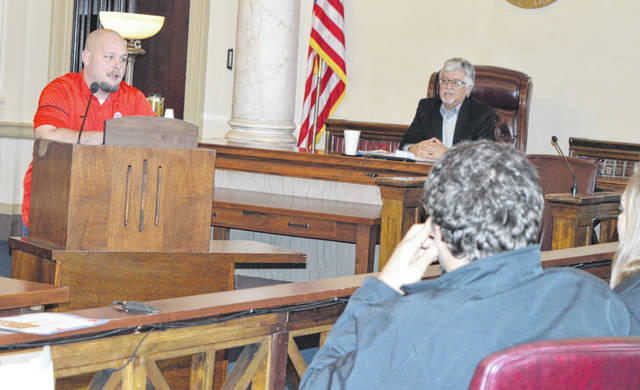

WILMINGTON — This time a year ago, Shawn M. Swick was a patient at Glenbeigh in Rock Creek, Ohio on a diagnosis of “Opiate Use Disorder”. Swick, formerly a family physician in Wilmington, today remains unemployed and without a medical license.
He spoke Friday to participants of the Clinton County You-Turn Recovery Docket, created five years ago for those with addiction issues.
Not long ago, Swick said, somebody asked him ‘What would you now tell the four-years-ago-you?’ if he had a time machine.
“I said I would have told me, ‘Just admit it. Just ask for help. You have way more support out there than you have any idea’,” Swick told the dozen or so Drug Court participants.
He added he had felt sure that when everything became public knowledge, he would be spurned. But except for a few detractors, the response was “the exact opposite” of what he feared.
“Everybody who comes up to me just wants me better, which is what I want and what my family wants,” said Swick.
He gave his background and told those in the Common Pleas Courtroom how he, as a person trained in medicine, thinks he became chemically dependent.
In 2003 Swick earned his M.D. degree from the Medical College of Ohio, now called the University of Toledo College of Medicine. He then came to Clinton County and did his residency work within a CMH and University of Cincinnati program at the time. He completed his medical residency here in 2006 and stayed here when he joined Main Medical in Wilmington.
He also worked at Wilmington College where he was the physician, and additionally did a lot of volunteer work in the community.
To help fill in the details of the origins of his substance abuse, Swick recounted he had a detached retina in his left eye while in medical school. He woke up one day and couldn’t see out of that eye.
Surgery on it followed and the vision in his left eye returned, but because of the medical issue he got migraine headaches, said Swick.
To get rid of the headaches, he occasionally took pain medicine at the time and it took care of the pain.
Fast forward to after his education and training and he was practicing medicine on Main Street and the college campus and doing lots of volunteer work. He said he easily worked 100 hours a week, not to mention having “a bunch of kids.”
Swick feels his inability to say ‘no’ and take time for himself resulted in a piling on of stress, and he didn’t know how to deal with it.
But he found that the pain medication he’d used for the headaches made everything seem easier. If he had a bad day at work, the pain med could make life a little easier.
“And then it just kind of kept growing and growing, so as opposed to borrowing other people’s medicines, I decided ‘Hell I’ve got a prescription pad, I’ll just use it’,” he said.
Swick said he mis-used the trust he enjoyed as a doctor in the community at the pharmacies in town. It was not uncommon for him to write someone a prescription, say an elderly person, and go get it and then take it to the shut-in.
“So I started writing prescriptions for a couple different people, and didn’t take it to anybody’s house other than my own,” admitted Swick.
About four years ago he began using pain meds pretty regularly, he said. In a December 2018 written agreement between the State Medical Board of Ohio and Swick, he admits he wrote nearly a combined 200 prescriptions, including Oxycodone, Hydromet, Percocet and Hydrocodone, for a patient and/or family members which were for his personal use.
His wife found out in October 2017 and he decided to get off drugs, and was able to wean himself off, basically doing the detox on his own, he said. Sometime in March 2018 he went off the drugs completely, and then the state pharmacy board showed up at his door.
“This can happen to anyone, and it doesn’t mean you’re a bad person,” Swick advised the drug court participants. “For some reason there’s something in our brains that doesn’t work like other folks. Once that switch is flipped, it’s flipped and you can’t unflip it.”
The biggest worry Swick has about drug addiction at this juncture is his bad shoulder and a bad knee. He knows he will have to have surgery on them at some point, and that scares him more than anything because those patients have to take pain medication to do therapy.
Swick said his biggest goal is to get back to practicing medicine here in Wilmington because he likes the town, and will use his experiences to help the public.
The public perception of addiction as some type of moral character flaw needs to change, he said.
“Because this truly is a disease. Yes, you chose that first time. But once that switch gets flipped, you don’t get to choose anymore whether you want to flip it,” said Swick.
Reach Gary Huffenberger at 937-556-5768.



